|
|
|
Sort Order |
|
|
|
Items / Page
|
|
|
|
|
|
|
| Srl | Item |
| 1 |
ID:
119450
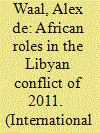

|
|
|
|
|
| Publication |
2013.
|
| Summary/Abstract |
Libya's relationship with sub-Saharan Africa has been complex, troubled and misunderstood, both during the rule of the late Libyan leader Muammar Gaddafi and the conflict that culminated in his overthrow and death. The Libyan conflict of 2011 divided Africa, but nonetheless the African Union (AU) was able to agree on a political strategy aimed at achieving a negotiated settlement and power transition.
The AU's peace initiative was launched in March 2011 and, contrary to widespread perception that the AU sought to prop up Gaddafi, it offered a credible and balanced option of a negotiated solution. United Nations Security Council resolution 1973 expressed support for the initiative, but in the event France, Britain and the United States blocked its chances of success.
This article draws on evidence and analysis provided by the AU officials involved. It details the process whereby the AU adopted and implemented its decisions, and describes the AU's diplomatic engagement with Gaddafi and the National Transitional Council. The article also draws on information provided by Sudanese military and intelligence officials, providing an account, hitherto untold, of how the Sudanese government supported the Libyan opposition with military supplies, training and intelligence, in tacit cooperation with NATO countries.
The article concludes with reflections on how the Libyan conflict has had an impact on the doctrine of the 'responsibility to protect', on the AU, and on Libya's relations with Africa.
|
|
|
|
|
|
|
|
|
|
|
|
|
|
|
|
| 2 |
ID:
119662
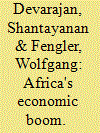

|
|
|
|
|
| Publication |
2013.
|
| Summary/Abstract |
Sub-Saharan Africa's GDP has grown five percent a year since 2000 and is expected to grow even faster in the future. Although pessimists are quick to point out that this growth has followed increases in commodities prices, the success of recent political reforms and the increased openness of African societies give the region a good chance of sustaining its boom for years to come.
|
|
|
|
|
|
|
|
|
|
|
|
|
|
|
|
| 3 |
ID:
119122


|
|
|
|
|
| Publication |
2013.
|
| Summary/Abstract |
THIS BRIEFING EXPLORES SOME POLITICAL IMPLICATIONS of the current boom in information and communications technology (ICT) in sub-Saharan Africa. As a striking manifestation of globalization, perhaps half of Africa's one billion people are now signed up as subscribers to cellular telephone networks.1 Africans are enthusiastically adopting mobile phone technology, here called 'cell' phones. By foregoing landlines in favour of advanced telecom systems, their choices of technology are leapfrogging over other parts of the world.
|
|
|
|
|
|
|
|
|
|
|
|
|
|
|
|
| 4 |
ID:
111196
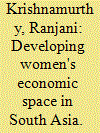

|
|
|
| 5 |
ID:
078152
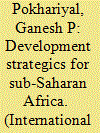

|
|
|
| 6 |
ID:
118663
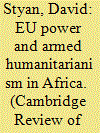

|
|
|
|
|
| Publication |
2012.
|
| Summary/Abstract |
This article analyses the European Union's (EU's) largest European Security and Defence Policy (ESDP) military mission outside Europe to date; Eufor Tchad/RCA was a 3700-strong force involving personnel from 23 states, deployed to Chad and the Central African Republic for 12 months from March 2008. Far from this mission achieving EU 'supremacy' or projecting an 'imperial' reach, an evaluation of its objectives and achievements reveals acute limitations in the EU's ability to project power. The article analyses the context in which Eufor was conceived and deployed. It notes that the mission's weaknesses, like those of the United Nations mission to whom the EU transferred its security role in 2009, reflected its convoluted origins and objectives. Finally, the article examines whether the EU as a unitary actor has the desire or the ability to 'replace' individual European nations-in this case France-in their post-colonial military and 'humanitarian' roles in sub-Saharan Africa.
|
|
|
|
|
|
|
|
|
|
|
|
|
|
|
|
| 7 |
ID:
114929
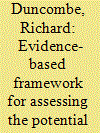

|
|
|
|
|
| Publication |
2012.
|
| Summary/Abstract |
This paper provides a framework-based approach for assessing the potential for mobile finance (m-finance) services to achieve greater financial inclusion in sub-Saharan Africa. The conceptual approach synthesises market and user perspectives, and constructs an evidence-based exploratory framework based on analysis of a single country, Uganda. Case evidence is used to inform four lifecycle stages for m-finance, moving from design to access, usage, and outcomes associated with differentiated m-finance applications. Based on analysis of published sources, findings from Uganda suggest that early adoption of m-finance has favoured those already financially included and market-driven solutions for the financially excluded are limited. Simple market modelling is found to be an insufficient basis on which to assess potential amongst the unbanked majority. The paper argues that the perception, behaviour and capability of users, and forms of user appropriation, should be a paramount concern, and potential for m-finance should be considered within a deeper understanding of a specified financial services context and within a defined market, regulatory and policy environment.
|
|
|
|
|
|
|
|
|
|
|
|
|
|
|
|
| 8 |
ID:
057098
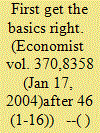

|
|
|
| 9 |
ID:
160245
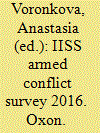

|
|
|
|
|
| Publication |
Oxon, Routledge, 2016.
|
| Description |
340p.pbk
|
| Standard Number |
9781857438611
|
|
|
|
|
|
|
|
|
|
|
|
Copies: C:1/I:0,R:1,Q:0
Circulation
| Accession# | Call# | Current Location | Status | Policy | Location |
| 059476 | 355.0205/VOR 059476 | Main | On Shelf | Reference books | |
|
|
|
|
| 10 |
ID:
152437
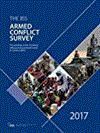

|
|
|
|
|
| Publication |
Oxon, Routledge, 2017.
|
| Description |
368p.pbk
|
| Contents |
Membership
|
| Standard Number |
9781857439144
|
|
|
|
|
|
|
|
|
|
|
|
Copies: C:1/I:0,R:1,Q:0
Circulation
| Accession# | Call# | Current Location | Status | Policy | Location |
| 059016 | 355.02/VOR 059016 | Main | On Shelf | Reference books | |
|
|
|
|
| 11 |
ID:
160242
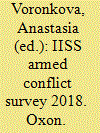

|
|
|
|
|
| Publication |
Oxon, Routledge, 2018.
|
| Description |
368p.pbk
|
| Standard Number |
9781857439564
|
|
|
|
|
|
|
|
|
|
|
|
Copies: C:1/I:0,R:1,Q:0
Circulation
| Accession# | Call# | Current Location | Status | Policy | Location |
| 059475 | 355.0205/VOR 059475 | Main | On Shelf | Reference books | |
|
|
|
|
| 12 |
ID:
166285
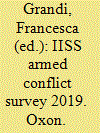

|
|
|
|
|
| Publication |
Oxon, Routledge, 2019.
|
| Description |
368p.pbk
|
| Standard Number |
9780367273583
|
|
|
|
|
|
|
|
|
|
|
|
Copies: C:1/I:0,R:0,Q:0
Circulation
| Accession# | Call# | Current Location | Status | Policy | Location |
| 059651 | 355.0205/GRA 059651 | Main | On Shelf | General | |
|
|
|
|
| 13 |
ID:
171456
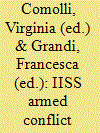

|
|
|
|
|
| Publication |
Oxon, Routledge, 2020.
|
| Description |
400p.pbk
|
| Standard Number |
9780367541507
|
|
|
|
|
|
|
|
|
|
|
|
Copies: C:1/I:0,R:0,Q:0
Circulation
| Accession# | Call# | Current Location | Status | Policy | Location |
| 059867 | 355.0205/COM 059867 | Main | On Shelf | General | |
|
|
|
|
| 14 |
ID:
119754
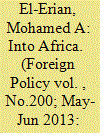

|
|
|
| 15 |
ID:
119403
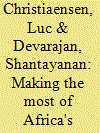

|
|
|
|
|
| Publication |
2013.
|
| Summary/Abstract |
Direct dividend transfer programs are promising as an additional instrument to reduce inequality and increase the poverty-reducing powers of economic growth in resource-rich countries.
|
|
|
|
|
|
|
|
|
|
|
|
|
|
|
|
| 16 |
ID:
119947
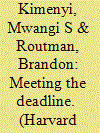

|
|
|
| 17 |
ID:
122789
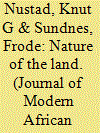

|
|
|
|
|
| Publication |
2013.
|
| Summary/Abstract |
Green-grabbing has recently been suggested as a label for describing processes of dispossessions undertaken in the name of conservation in sub-Saharan Africa. For the case examined here, the Dukuduku forest and the Mfolozi flats in northern KwaZulu-Natal, we will argue that the label obscures more than it helps illuminate the complex processes leading up to the present-day struggle over land rights. The land in question has been subjected to a number of different land uses in the past: hunting, conservation, commercial agriculture and small-scale agriculture. We show how contestation over desirable future land use options lies at the heart of the problems raised by an ongoing land claim to the forest.
|
|
|
|
|
|
|
|
|
|
|
|
|
|
|
|
| 18 |
ID:
083091
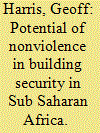

|
|
|
| 19 |
ID:
121588
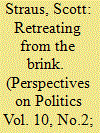

|
|
|
|
|
| Publication |
2012.
|
| Summary/Abstract |
The research problem driving this paper is the absence of a strong theory that accounts for variation among cases that have similar probabilities of escalating to genocide and similar forms of organized (usually state-led) mass violence against civilians. Much of the existing theory on genocide focuses on explaining under what conditions and by what processes regimes commit large-scale violence against civilians. I argue that a critical missing dimension to studies of genocide, but also more generally to the study of political violence, is a methodological recognition of negative cases and a theoretical recognition of the dynamics of restraint that helps to explain such negative cases. That is, in addition to asking what causes leaders to choose to escalate violence, I argue that scholars should emphasize conditions that prompt moderation, de-escalation, or non-escalation. I propose an alternative framework for how to conceptualize the process of political violence and review the literature to identify key restraint mechanisms at micro, meso, and macro levels of analysis. I further articulate a provisional theory of genocide using this new analytical framework. I illustrate my argument with an empirical analysis of mass violence cases in Sub-Saharan Africa since independence, and with a more in-depth analysis of comparable crises in Rwanda and Côte d'Ivoire, where the trajectories of violence differed significantly. While this paper draws on extensive empirical research, my primary purpose is not to advance a developed new theory or to test particular hypotheses, but rather to outline a research agenda that promises to draw from and contribute to recent work on the comparative politics of violence.
|
|
|
|
|
|
|
|
|
|
|
|
|
|
|
|
| 20 |
ID:
156857
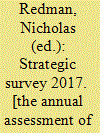

|
|
|
|
|
| Publication |
Oxon, Routledge, 2017.
|
| Description |
302p.pbk
|
| Standard Number |
9781857439168
|
|
|
|
|
|
|
|
|
|
|
|
Copies: C:1/I:0,R:1,Q:0
Circulation
| Accession# | Call# | Current Location | Status | Policy | Location |
| 059261 | 355.4073/RED 059261 | Main | On Shelf | Reference books | |
|
|
|
|
|
|
|
|
|